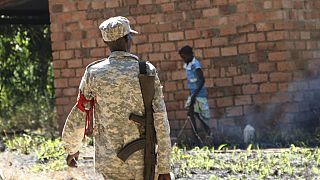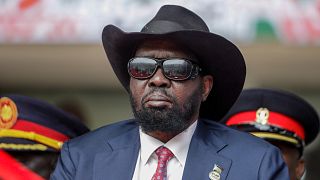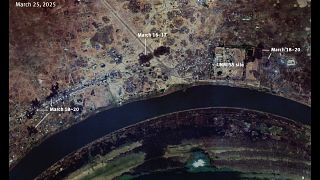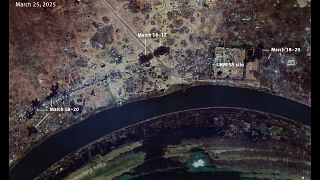South Sudan
South Sudan is not ready to hold its first post-independence elections in December and political players are discussing whether voting should be held this year, the U.N.’s top envoy in the troubled African country said Wednesday.
Nicholas Haysom told the U.N. Security Council that the consultations make it difficult to treat the election date of Dec. 22 announced last month by the National Elections Commission “as a definitive trigger in isolation from other critical factors.”
The vote, which would be the first since South Sudan gained independence from Sudan in 2011 after a long conflict, is meant to be the culmination of a peace agreement signed five years ago to pull the world’s newest nation out of a civil war largely based on ethnic divisions. Fighting between forces loyal to the current president, Salva Kiir, battled those loyal to the current vice president, Riek Machar, killing some 400,000 people.
Last December, Haysom outlined a series of conditions needed to hold credible and peaceful elections. In April, he told the Security Council the parties hadn’t implemented a “critical mass” of the key steps for free and fair elections — and he told the U.N.’s most powerful body Wednesday that his assessment is the same today.
On a positive note, he said the Elections Commission has started assessing “the ground-level infrastructure and facilities required for a conducive environment for conducting elections,” and 29 political parties have been registered.
The U.N. peacekeeping mission continues “to support the creation of an enabling environment for elections in South Sudan whenever they are held,” focusing on its mandate to help protect civilians, Haysom said..
He said there are concerns among large segments of civil society, political parties, the Commission on Human Rights and the international community about a bill recently passed by South Sudan's parliament that grants the National Security Service the power to make arrests without a warrant.
Critics of the security bill say it contradicts “their aspirations for open civic and political space” to build a democratic society and is incompatible with the spirit of South Sudan's transitional constitution and its human rights obligations, he said.
“It has been noted that the president has the power to refer the law back to Parliament to remedy the criticisms that have been raised,” Haysom said. “This would be a significant opportunity to demonstrate a commitment to achieving the open political space in which to conduct South Sudan’s first democratic elections.”
U.S. Ambassador Linda Thomas-Greenfield told the council that the United States and many diplomatic missions are deeply concerned that the security law could “further erode the country’s political and civic environment.”
Turning to the country’s humanitarian and economic outlook, Haysom warned that “a perfect storm is gathering.”
He pointed to chronic food insecurity, the spillover of the conflict in neighboring Sudan, a rapidly deteriorating economy exacerbated by a ruptured oil pipeline and a cut in revenue, “and the potential for once-in-a-lifetime flooding in September.”
“Any one of these elements on its own presents a significant challenge,” Haysom said. “When taken together, it could push the country to a tipping point — and all during a time where the people of South Sudan are embarking on a delicate phase of nation-building.”
Edem Wosornu, the U.N. humanitarian office’s operations director, gave the council some stark figures — more than 9 million people, 76% of South Sudan’s population, require humanitarian assistance and 7.1 million are “acutely food insecure, an increase of about 1.5 million people since last year.”
Wosornu said mid-year projections by U.N. food security experts suggested that conflict and flooding “could result in pockets of famine between June 2024 and January 2025.”
South Sudan’s humanitarian plight is worsened by a deepening economic crisis, she said. Most oil exports have halted since February because of the ruptured pipeline. A more than 70% depreciation of the South Sudanese pound in the first six months of 2024 has made basic commodities unaffordable for many people, with the annual inflation rate reaching 97% in June, according to the National Bureau of Statistics.
Humanitarian and economic outlook
The head of the UN’s Mission in South Sudan on Wednesday told the Security Council that “a perfect storm is gathering in South Sudan as regards its humanitarian and economic outlook.”
Speaking virtually to the UN, Nicholas Haysom, stressed that “time is running out, and the costs of inaction at this juncture are too great.”
Haysom said the humanitarian crisis in the country is “founded on chronic food insecurity, a spill-over of the Sudan conflict into South Sudan resulting in the movement so far of 750,000 refugees and internally displaced people, uncertainties in the face of critical political events necessary for a peaceful transition, a rapidly deteriorating economy exacerbated by the rupture in critical oil infrastructure and oil revenue, and the potential for once in a lifetime flooding in September.”
He added that “should the elements of the perfect storm converge it would stretch beyond the respective capacities of the United Nations and risk derailing the country's political transition. The implications for the broader East African region would be significant.”
Haysom told Council members that UNMISS continues to support the creation of an enabling environment for elections in South Sudan.
Also addressing the Council was Edem Wosornu, Director of the Operations and Advocacy Division at the Office for the Coordination of Humanitarian Affairs, or OCHA.
She as many as 300,000 people had been affected by floods brought on by heavy rains and along with the calculated release of water from Lake Victoria, which “have led to increased Nile River levels.”
At the peak of the flood season, Wosornu said, “flooding could impact up to 3.3 million people. This includes communities yet to recover from the devastating floods which occurred between 2019 and 2022, and which displaced more than one million people.”
She told the Council that South Sudan is in the grips of a growing food insecurity crisis, a climate crisis, and an economic crisis, all while suffering the impact of the conflict in Sudan and dwindling financial support for the humanitarian response. However, underfunding continues to hamper an adequate response.
For his part, the Interim Chairperson of the Reconstituted Joint Monitoring and Evaluation Commission, Retired Maj. Gen. Charles Tai Gituai said the Political Parties Council, in preparation for elections, had “adopted a code of conduct and registered 29 political parties.”
He said concerns exist regarding the procedures followed and the registration fees.
“The National Elections Commission has reconstituted as state level high committees. But there are still concerns about criteria used and gender representation,” he added.
South Sudanese ambassador Cecilia A.M. Adeng said that while the country has made significant strides, “including the allocation of funds to the National Election Commission, the Political Parties Council, and the National Constitutional Review Commission, we recognize that benchmarks for holding the elections still need to be fully met. We are working diligently to address these challenges and reiterate our dedication to ensuring smooth and inclusive electoral process.”
The Council met to consider the Secretary-General's report on South Sudan.











01:16
Africa mourns Pope Francis, a voice for peace and justice
Go to video
African Union mediators hold talks to resolve political crisis in South Sudan
01:14
US to revoke all visas held by South Sudanese passport holders
01:28
South Sudan tensions: Kiir, Museveni hold talks in Juba
01:28
Museveni visits Juba amid tension in the oil-rich east African nation